|
|
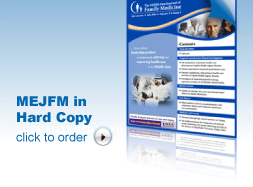 |
| ............................................................. |
|
|
| ........................................................ |
| From
the Editor |

|
Editorial
A. Abyad (Chief Editor) |
|
|
|
|
........................................................
|
Original
Contribution/Clinical Investigation
|
|
|
<-- Abu Dhabi -->
Knowledge,
attitude and behaviour of asthmatic patients
regarding asthma in primary care setting in
Abu Dhabi, United Arab Emirates
[pdf version]
Osama Moheb Ibrahim Mohamed, Wael Karameh Karameh
<-- Egypt -->
DASH Diet: How
Much Time Does It Take to Reduce Blood Pressure
in Pre-hypertensive and Hypertensive Group 1
Egyptian patients?
[pdf version]
Rehab Abdelhai, Ghada Khafagy, Heba Helmy
<-- Egypt -->
Assessment of TB
stigma among patients attending chest hospital
in Suez Canal University area, Egypt
[pdf version]
Nahed Amen Eldahshan, Rehab Ali Mohammed, Rasha
Farouk Abdellah, Eman Riad Hamed
<-- Egypt -->
Awareness
of diabetic retinopathy in Egyptian diabetic
patients attending Kasra Al-Ainy outpatient
clinic: A cross-sectional study
[pdf version]
Marwa Mostafa Ahmed, Mayssa Ibrahim Ali, Hala
Mohamed El-Mofty, Yara Magdy Taha
<-- Iraq -->
Estimation of
some biophysical parameters in semen of fertile
and infertile patients
[pdf version]
Dhahir Tahir Ahmad, Suhel Mawlood Alnajar, Tara
Nooradden Abdulla, Zhyan Baker Hasan
|
|
........................................................ |
Medicine and Society
|



|
<-- Iraq -->
Celebrating lives
from the Region
[pdf version]
Lesley Pocock
<-- Regional/International -->
Health
Promotion, Disease Prevention and Periodic Health
Checks: Perceptions and Practice among Family
Physicians in Eastern Mediterranean Region
[pdf version]
Waris Qidwai, Kashmira Nanji, Tawfik A M Khoja,
Salman Rawaf, Nabil Yasin Al Kurashi, Faisal
Alnasir, Mohammed Ali Al Shafaee, Mariam Al
Shetti,Nagwa Eid Sobhy Saad, Sanaa Alkaisi,
Wafa Halasa, Huda Al-Duwaisan, Amal Al-Ali
<--
Australia/Iran -->
Virology
vigilance - an update on MERS and viral mutation
and epidemiology for family doctors
[pdf version]
Lesley Pocock, Mohsen
Rezaeian
|
........................................................
|
Chief
Editor -
Abdulrazak
Abyad
MD, MPH, MBA, AGSF, AFCHSE
.........................................................
Editorial
Office -
Abyad Medical Center & Middle East Longevity
Institute
Azmi Street, Abdo Center,
PO BOX 618
Tripoli, Lebanon
Phone: (961) 6-443684
Fax: (961) 6-443685
Email:
aabyad@cyberia.net.lb
.........................................................
Publisher
-
Lesley
Pocock
medi+WORLD International
11 Colston Avenue,
Sherbrooke 3789
AUSTRALIA
Phone: +61 (3) 9005 9847
Fax: +61 (3) 9012 5857
Email:
lesleypocock@mediworld.com.au
.........................................................
Editorial
Enquiries -
abyad@cyberia.net.lb
.........................................................
Advertising
Enquiries -
lesleypocock@mediworld.com.au
.........................................................
While all
efforts have been made to ensure the accuracy
of the information in this journal, opinions
expressed are those of the authors and do not
necessarily reflect the views of The Publishers,
Editor or the Editorial Board. The publishers,
Editor and Editorial Board cannot be held responsible
for errors or any consequences arising from
the use of information contained in this journal;
or the views and opinions expressed. Publication
of any advertisements does not constitute any
endorsement by the Publishers and Editors of
the product advertised.
The contents
of this journal are copyright. Apart from any
fair dealing for purposes of private study,
research, criticism or review, as permitted
under the Australian Copyright Act, no part
of this program may be reproduced without the
permission of the publisher.
|
|
|
| July / August
2015 - Volume 13 Issue 5 |
|
Health
Promotion, Disease Prevention and Periodic Health
Checks: Perceptions and Practice among Family
Physicians in Eastern Mediterranean Region
Waris
Qidwai (1)
Kashmira Nanji (1)
Tawfik A M Khoja (2)
Salman Rawaf (3)
Nabil Yasin Al Kurashi (4)
Faisal Alnasir (5)
Mohammed Ali Al Shafaee (6)
Mariam Al Shetti (7)
Muntazar Bashir (8)
Nagwa Eid Sobhy Saad (9)
Sanaa Alkaisi (10)
Wafa Halasa (11)
Huda Al-Duwaisan (12)
Amal Al-Ali (13)
Taghreed M Farahat (14)
(1) Department of Family Medicine, Aga Khan
University, Karachi, Pakistan
(2) Director General, Executive Board, Health
Ministers' Council for Cooperation
Council States
(3) Professor of Public Health, Director, WHO
Collaborating Centre, Department of
Primary Care and Public Health, School of Public
Health, Faculty of Medicine
Imperial College London, UK
(4) University of Dammam, Saudi Arabia
(5) Department of Family & Community Medicine,
Arabian Gulf University, Bahrain
(6) Vice Dean for Clinical Affairs, Oman Medical
College, Sultanate of Oman
(7) Family Physician, Bahrain
(8) Department of Family Medicine, King Faisal
Specialist Hospital and Research Centre, Jeddah,
Saudi Arabia
(9) Department of Family Medicine, Cairo University,
Egypt
(10) Associate Professor of Community and Family
Medicine. Senior Consultant Family Physician.
Dubai
(11) Family Physician, Amman, Jordan
(12) Head of the Primary Health Care Faculty
at the Kuwait Institution for Medical Specialization.
(13) Assistant Program Director in Family Medicine
Residency Program, Qatar.
(14) Chair Person of Egyptian Family Medicine
Association and Faculty of Medicine, Menoufiya
University, Shebin El-Kom, Menoufia, Egypt
Reviewer:
Dr Mohammed Tarawneh
Wonca EMR President
Correspondence:
Dr. Waris Qidwai
Professor and Chairman,
Department of Family Medicine, Aga Khan University
Stadium Road, P.O. Box: 3500, Karachi 74800,
Pakistan
Fax: (9221) 3493-4294, 3493-2095
Email: waris.qidwai@aku.edu;
warisqidwaikarachi@yahoo.com
|
Abstract
Introduction: The
aim of this study was to identify the
current practices and perceptions of family
physicians regarding health promotion,
disease prevention including periodic
screening and health checks in Eastern
Mediterranean Region.
Methods: A
multi-country cross-sectional study was
conducted in six countries of EMR, from
September 2014 to March 2015. Family Physicians
who were currently practicing in different
countries of EMR were invited to participate
in the study through email. A pre-tested
structured questionnaire was used for
data collection. Data was entered and
analyzed on SPSS 19 and logistic regression
analysis was performed.
Results: A
total of 100 physicians' data was included
in the final analysis. The majority were
female physicians (76%): 63% were 25 to
35 years of age. Approximately 53% of
Family physicians always recommend periodic
screening and health checks to their patients.
The common screening question asked to
patients in medical history was related
to their blood pressure (86%). Almost
all (99%) of the Family physicians believe
they should conduct periodic health checks.
Those who had postgraduate training in
Family Medicine (OR: 0.5; 95% CI: 0.39-1.67)
and attended CME sessions regularly (OR:
0.11; 95% CI: 0.01-0.93), are more likely
to recommend periodic screening and health
checks to their patients.
Conclusion: Periodic
screening and health check is an important
strategy to prevent disease and maintain
health. It is an underutilized practice
and a great need exists for its implementation
in family practice.
Key words:
Periodic Screening, Health Screening,
Health Check; Physical Examination; Health
Assessment; Family Physicians
|
Healthcare around the world is becoming sophisticated
and expensive when it comes to its provision
to the entire population. Availability of treatment
options due to technological advances on one
hand, and a rapidly increasing elderly population
with multiple co-morbidities on the other is
putting immense pressure on limited resources
for healthcare provision.(1) Such valuable resources
should be used efficiently. Thus, a strong focus
on early disease detection through evidence-based
and effective screening programs and regular
health checks to specific age groups will help
reduce disease burden and offer health service
coverage to a larger segment of population to
achieve universal health coverage.(2)
Periodic health screening and checks have assumed
a very important position in primary care and
family medicine, for their value for money in
disease prevention, health maintenance and early
detection of diseases. These examinations offer
an effective strategy to detect diseases early
and offer cost-effective intervention options
and with good outcomes.(3)
Evidence-based screening strategies and tests
are designed to pick up diseases early.(4) There
is criticism of periodic screening and health
checks that they have not shown outcome-based
benefit.(5) It has been found much more useful
when selected populations at higher risk for
a medical condition are subjected to effective
screening programs.(6) Despite all the criticism,
evidence exists for early detection of diseases
through periodic screening and health checks.(7)
There is substantial acceptance for periodic
screening and health check and screening among
patients, but costs for these measures and tests
are a cause for decreased interest for such
preventive health interventions.(8) Benefits
of periodic screening and health checks have
been demonstrated, yet more research is needed.(9,10)
It is most challenging for a Family Physician
to decide which patient to screen and to select
the most appropriate screening method. Patients
are presenting for periodic screening and health
checks often have a hidden agenda such as a
fear of underlying malignancy for example and
this aspect much be kept in mind.(11)Eastern
Mediterranean countries are faced with huge
disease burden and a focus on health promotion,
and disease prevention is essential to reduce
such burden. We identified a need to look at
the practices and perceptions of Family Physicians
from the Region with regards to health promotion,
disease prevention including periodic screening
and health checks.
Study
Setting
A
multi
country
cross-sectional
study
was
conducted
across
six
countries
(Bahrain,
Egypt,
Iraq,
Kuwait,
Pakistan
and
Saudi
Arabia)
of
the
22
countries
of
the
Eastern
Mediterranean
Region
(EMR),
from
September
2014
to
March
2015.
These
countries
were
selected
to
obtain
perceptions
and
practice
of
Family
Physicians
regarding
health
promotion,
disease
prevention
including
periodic
screening
and
health
checks.
Selection
of
participants
Family
Physicians
who
were
currently
practicing
in
these
six
countries
of
EMR
were
invited
to
participate
in
the
study.
They
were
informed
about
the
study
protocol
and
were
requested
to
participate
in
the
study
and
return
the
filled
questionnaire
through
email
within
a
month.
Reminders
were
sent
every
week
to
the
Family
Physicians
who
agreed
to
participate
in
the
study.
Informed
Consent
The
information
about
the
study
protocol
and
consent
forms
were
sent
to
each
Family
Physician
who
agreed
to
participate
in
the
study,
and
they
were
asked
to
return
the
signed
consent
form.
The
study
was
conducted
in
accordance
with
the
Helsinki
Declaration
and
the
Departmental
Research
Committee
of
the
Aga
Khan
University
reviewed
and
approved
the
study.
Study
Questionnaire
A
questionnaire
was
formulated
after
compiling
important
aspects
of
periodic
health
evaluation
through
extensive
literature
search
and
by
taking
expert
suggestions.
The
questionnaire
was
initially
prepared
in
English;
however,
it
was
also
translated
to
Arabic,
as
it
is
a
common
language
in
the
region.
The
questionnaire
was
pre-tested
on
five
physicians
and
ambiguities
found
were
removed.
The
questionnaire
was
composed
of
2
sections:
The
first
section
covers
demographic
details
of
the
participants,
while
the
second
section
focuses
on
perceptions
and
practices
of
physicians
regarding
health
promotion,
disease
prevention
including
periodic
screening
and
health
checks.
Statistical
Analysis
Data
was
entered
and
analyzed
in
SPSS
version
19.0.
The
analysis
was
completed
in
two
stages
i.e.
descriptive
and
inferential.
Frequencies
of
all
the
variables
were
reported
in
the
descriptive
analysis.
In
the
2nd
stage,
logistic
regression
analysis
was
performed
to
identify
the
factors
that
promote
Family
physicians
to
recommend
periodic
health
evaluation
to
their
patients.
In
the
regression
analysis
the
outcome
was
Family
physicians
who
recommend
health
evaluation
to
their
patients
(Yes/No).
Univariate
analysis
was
carried
out
to
obtain
the
independent
effects
of
factors
on
the
outcome.
Since
none
of
the
variables
were
found
to
be
significant
at
the
Univariate
level,
therefore,
multivariate
regression
was
not
performed.
The
results
were
reported
in
the
form
of
unadjusted
odds
ratio
along
with
their
95%
confidence
interval.
Throughout
the
analysis
a
P
value
of
<
0.05
was
considered
statistically
significant.
Table
1:
Baseline
characteristics
of
Study
Participants
(n=100)
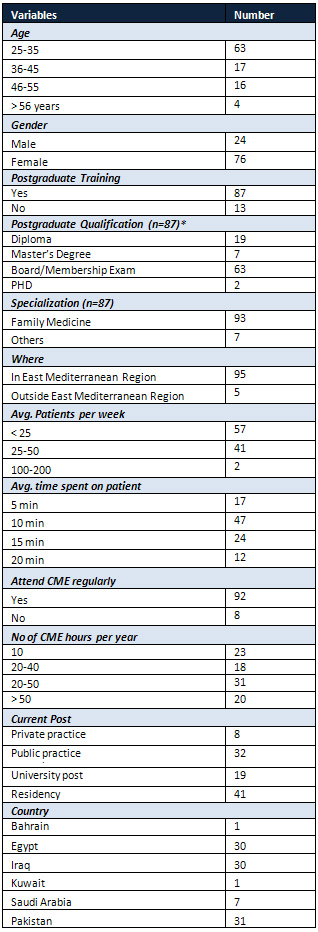
*Sum
cannot
be
100
as
some
FPs
had
more
than
1
degree
The
demographic
characteristics
of
the
participating
physicians
are
presented
in
Table
1.
A
total
of
100
Physicians
returned
completed
questionnaires
and
were
included
in
the
final
analysis.
The
response
rate
was
71%
(100/140).
The
majority
of
the
sample
population
were
female
physicians
(76%)
and
63%
of
them
were
between
25
to
35
years
of
age.
About
87%
of
the
physicians
had
a
postgraduate
training;
93%
had
done
specialization
in
Family
Medicine.
Slightly
over
two-fifths
(41%)
were
in
their
residency
programs
and
32%
working
in
the
public
sector.
On
an
average
57%
see
less
than
25
patients
per
session
and
47%
spend
at
least
10
minutes
with
each
patient
during
consultation.
A
vast
majority
of
participants
attended
CME
regularly;
with
31%
attending
20
to
50
CME
credit
hours
per
year.
Of
the
total
physicians
sample,
the
majority
were
from
Pakistan
(31%),
followed
by
Egypt
(30%)
and
Iraq
(30%).
Table
2:
Family
Physician
questions
asked
in
history
and
Physical
examination
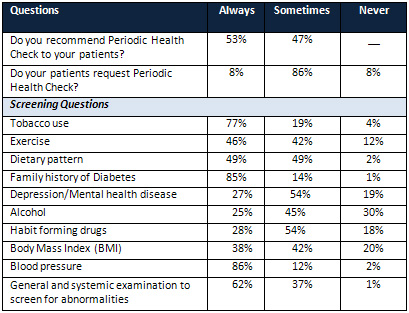
There
are
limited
national
screening
programs
in
the
surveyed
countries
which
reflected
poor
quality
of
health
service
planning
in
these
countries.
Approximately
53%
of
the
Family
Physicians
(FPs)
responded
that
they
always
recommend
periodic
screening
health
checks
to
their
patients.
The
clinical
practice
screening
questions
asked
in
history
and
in
physical
examination
are
given
in
Table
2.
The
FPs
common
health
checks
questions
asked
from
patients
in
medical
history
were
related
to
their
blood
pressure
(86%),
closely
followed
by
family
history
of
diabetes
(85%)
and
tobacco
use
(77%).
However,
the
least
common
questions
asked
from
patients
were
about
alcohol
(25%),
mental
health
status
of
patients
(27%)
and
Body
Mass
Index
(38%).
Table
3:
Investigations
&
Health
Education
as
part
of
Periodic
Check
Up
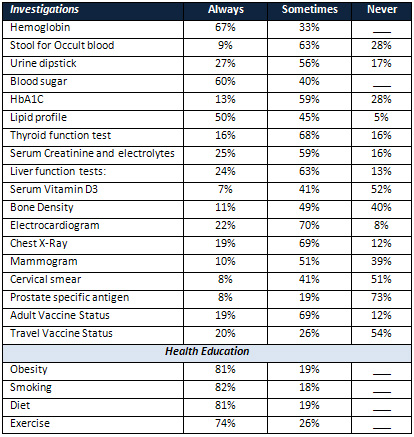
Clinical
practice
investigations
as
part
of
periodic
physical
examination
are
presented
in
Table
3.
Over
two
thirds
(67%)
of
the
FPs
responded
that
they
always
use
hemoglobin
as
clinical
marker
in
health
evaluations.
About
60%
always
order
blood
sugar
and
50%
request
for
lipid
profile.
51%
of
them
mentioned
that
they
never
advised
patients
for
cervical
smear,
73%
of
them
never
asked
patients
to
get
prostate
specific
antigen,
and
about
54%
didn't
ask
about
the
travel
vaccine
status.
The
majority
of
them
provide
counseling
to
patients
during
periodic
health
checks
on
obesity
and
diet
(81%),
smoking
(82%)
and
exercise
(74%).
Table
4:
Perceptions
of
Family
Physicians
regarding
Periodic
Health
Check
Up
(n=100)
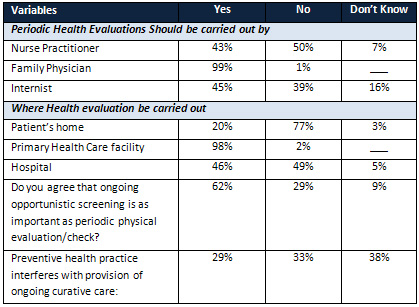
Almost
all
(99%)
FPs
were
of
the
view
that
periodic
heath
evaluations
should
be
conducted
by
them
while
43%
believed
that
they
should
be
conducted
by
nurses.
Besides
that,
98%
of
them
responded
that
the
evaluation
should
be
conducted
in
primary
health
center
clinics.
As
far
as
frequency
of
periodic
health
evaluations
is
concerned,
73%
of
them
would
recommend
health
evaluations
every
year,
whereas,
17%
recommend
it
every
two
years
and
10%
every
three
years.
62%
of
the
Family
physicians
agree
that
ongoing
opportunistic
check
is
as
important
as
periodic
health
evaluations.
About
one
third
of
them
believed
that
preventive
health
practices
do
not
interfere
with
ongoing
disease
treatment
and
care
(Table
4).
Figure
1:
Factors
that
promote
Family
Physicians
Periodic
Health
Evaluations
Practice

Univariate
logistic
regression
analysis
*Attendance
in
CME
significant
at
p
value
<
0.05
Figure
1
depicts
the
factors
that
motivate
FPs
to
recommend
periodic
screening
health
checks
to
their
patients.
Those
who
had
a
postgraduate
training
in
Family
Medicine
(OR:
0.5;
95%
CI:
0.39-1.67)
are
more
likely
to
recommend
health
evaluations
to
their
patients.
Likewise,
those
who
attend
CME
sessions
regularly
(OR:
0.11;
95%
CI:
0.01-0.93)
and
those
who
are
working
as
trained
Family
physicians
(OR:
0.88;
95%
CI:
0.39-1.9)
are
promoters
of
periodic
screening
health
checks.
This
is
probably
among
the
first
studies
from
the
East
Mediterranean
region
that
looks
at
health
promotion,
disease
prevention
including
periodic
screening
health
checks
and
the
perception
and
practice
of
Family
Physicians
in
the
Region.
The
sample
was
limited
to
100
respondents;
the
majority
of
them
were
women,
in
residency
training
or
with
postgraduate
qualifications
and
undertaking
Continuing
Medication
Education
on
a
regular
basis.
Therefore,
it
will
not
be
possible
to
generalize
results
of
this
study
to
Family
Physicians
practicing
in
EMR.
Even
with
this
limitation,
results
of
our
study
do
offer
insight
into
the
knowledge,
attitude
and
practices
of
Family
Physicians
with
regards
to
health
promotion,
disease
prevention
including
periodic
screening
health
checks
in
the
region.
Half
of
respondents
in
this
study
recommend
periodic
screening
and
health
checks
to
their
patients.
Yet
it
is
disappointing
to
note
a
much
smaller
number
of
patients
request
these
important
health
services
from
their
doctors.
In
Eastern
Mediterranean
Countries,
an
earlier
study
showed
that
90%
of
the
Physicians
recommend
periodic
health
evaluation
to
patients.(12)
It
has
been
noted
that
patient's
preference
for
preventive
strategies
depends
on
household
income
and
education.(13)
It
is
again
encouraging
to
note
that
a
significant
number
of
respondents
ask
about
smoking,
exercise
and
diet
in
the
history
and
check
for
blood
pressure,
yet
a
much
smaller
number
actually
look
at
body
weight
and
BMI.
It
is
also
encouraging
to
note
that
a
substantial
number
of
respondents
recommend
blood
sugar,
lipid
profile,
hemoglobin,
serum
creatinine
and
LFTs
for
their
patients
during
these
health
checks
encounters.
A
need
exists
to
focus
on
adult
and
travel
vaccination
for
disease
prevention.
A
recent
study
has
shown
that
adult
immunization
coverage
is
less
than
satisfactory,
even
in
those
who
have
insurance
coverage.(14)
It
is
again
encouraging
to
note
respondent's
recommendation
for
lifestyle
related
patient
education
and
counseling.
The
recommendation
by
most
respondents
that
such
periodic
screening
and
health
checks
should
be
provided
in
primary
care
settings
is
more
than
welcomed,
even
though
a
substantial
number
of
them
feel
that
it
interferes
with
provision
of
ongoing
disease
treatment
and
care.
It
has
been
earlier
reported
that
need
for
acute
and
chronic
disease
treatment
and
care
interferes
with
the
provision
of
promotive
and
preventive
health
interventions.(15)
It
is
no
surprise
that
respondents
with
postgraduate
training
in
Family
Medicine
and
those
undertaking
CME
activities
recommended
periodic
screening
and
health
checks
more
often
to
their
patients.
The
study
indirectly
highlighted
the
shortcoming
in
the
health
systems
of
EMR
countries;
the
lack
of
national
systematic
approaches
to
periodic
screening
and
health
checks
to
target
population
based
on
best
evidence.
Promotion
and
prevention
interventions
at
community
(routine)
and
individuals
(opportunistic)
can
be
achieved
for
the
benefits
of
the
people
without
universal
health
coverage
through
comprehensive
primary
care
services
for
all.(2)
Research
is
required
to
demonstrate
long-term
benefits
of
delivering
several
preventive
interventions
during
preventive
health
examinations.
It
is
also
required
to
assess
such
interventions
in
the
context
of
different
populations
needs,
defining
comparisons
to
"routine
care"
and
carefully
evaluate
intermediate
outcomes,
harms
and
costs.(16)
Health
services
are
becoming
complex
and
expensive.
With
the
availability
of
new
intervention
modalities
and
an
increasing
ageing
population,
it
is
becoming
challenging
to
provide
adequate
health
service
coverage.
Given
this
background,
health
promotion,
disease
prevention
including
periodic
health
examinations
will
reduce
healthcare
costs
and
provide
funds
to
promote
access
to
healthcare
to
the
majority
of
those
who
need
it
and
with
equity.
We
have
found
support
for
health
promotion,
disease
prevention
including
periodic
screening
and
health
checks
in
this
study
and
recommend
its
practice
in
Eastern
Mediterranean
region.
1.
Qidwai
W.
Primary
care:
a
mandatory
requirement
for
effective
health
care.
J
Coll
Physicians
Surg
Pak.
2008;
18(4):199-200.
2.
World
Health
Organisation
(2014)
Universal
Health
Coverage:
Supporting
Country
Needs.
Geneva:
WHO
http://www.who.int/contracting/UHC_Country_Support.pdf?ua=1
3.
Virgini
V,
Meindl-Fridez
C,
Battegay
E,
Zimmerli
LU.
Check-up
examination:
recommendations
in
adults.
Swiss
Med
Wkly.
2015;145
4.
Prochazka
AV,
Lundah
K,
Pearson
W,
Oboler
SK,
Anderson
RJ.
Support
of
Evidence-Based
guidelines
for
the
annual
physical
examination:
a
survey
of
primary
care
providers.
Arch
Intern
Med.
2006;
166(13):1347-52.
5.
Perleth
M,
Matthias
K.
[The
periodic
health
examination:
from
law
to
the
directive
of
the
German
Federal
Joint
Committee
(G-BA)].
Z
Evid
Fortbild
Qual
Gesundhwes.
2014;
108(4):192-5
6.
Goldfarb
M,
Slobod
D,
Dufresne
L,
Brophy
JM,
Sniderman
A,
Thanassoulis
G.
Screening
Strategies
and
Primary
Prevention
Interventions
in
Relatives
of
People
with
Coronary
Artery
Disease:
A
Systematic
Review
and
Meta-analysis.
Can
J
Cardiol.
2015;
31(5):649-657
7.
Kermott
CA1,
Kuhle
CS,
Faubion
SS,
Johnson
RE,
Hensrud
DD,
Murad
MH.
The
diagnostic
yield
of
the
first
episode
of
a
periodic
health
evaluation:
a
descriptive
epidemiology
study.
BMC
Health
Serv
Res.
2012;
12:137
8.
Oboler
SK,
Prochazka
AV,
Gonzales
R,
Xu
S,
Anderson
RJ.
Public
expectations
and
attitudes
for
annual
physical
examinations
and
testing.
Ann
Intern
Med.
2002;
136(9):652-9
9.
Boulware
LE1,
Marinopoulos
S,
Phillips
KA,
Hwang
CW,
Maynor
K,
Merenstein
D
et
al.
Systematic
review:
the
value
of
the
periodic
health
evaluation.
Ann
Intern
Med.
2007;
146(4):289-300
10.
Boulware
LE,
Barnes
GJ,
Wilson
RF,
Phillips
K,
Maynor
K,
Hwang
C.
Value
of
the
periodic
health
evaluation.
Evid
Rep
Technol
Assess
(Full
Rep).
2006;
(136):1-134.
11.
Virgini
V1,
Meindl-Fridez
C1,
Battegay
E1,
Zimmerli
LU1.
Check-up
examination:
recommendations
in
adults.
Swiss
Med
Wkly.
2015;
145
12.
N.
Al-Rowais,
T.Khoja,
M.Al-Farra,
N.Al-Nahedh.
Primary
Health
Care
Physicians'
Views
on
Periodic
Health
Evaluation
in
Saudi
Arabia.
Eastern
Mediterranean
Health
Journal,
Vol
6,
Nos
2/3,
2000
13.
Laba
TL,
Howard
K,
Rose
J,
Peiris
D,
Redfern
J,
Usherwood
T
et
al.
Patient
preferences
for
a
polypill
for
the
prevention
of
cardiovascular
diseases.
Ann
Pharmacother.
2015;
49(5):528-39
14.
Lu
PJ,
O'Halloran
A,
Williams
WW.
Impact
of
Health
Insurance
Status
on
Vaccination
Coverage
among
Adult
Populations.
Am
J
Prev
Med.
2015
Apr
15
15.
Qidwai
W,
Jaffer
S,
Ali
SS,
Ayub
S.
Strategy
for
conducting
screening
health
clinics:
A
need
for
change.
Journal
of
Liaquat
University
of
Medicine
and
Health
Sciences.
2004
Jan-Jun;
03(01):
37-8.
16.
Boulware
LE,
Barnes
GJ,
Wilson
RF,
Phillips
K,
Maynor
K,
Hwang
C.
Value
of
the
periodic
health
evaluation.
Evid
Rep
Technol
Assess
(Full
Rep).
2006
Apr;
(136):1-134
|
|
.................................................................................................................

|
| |
|

